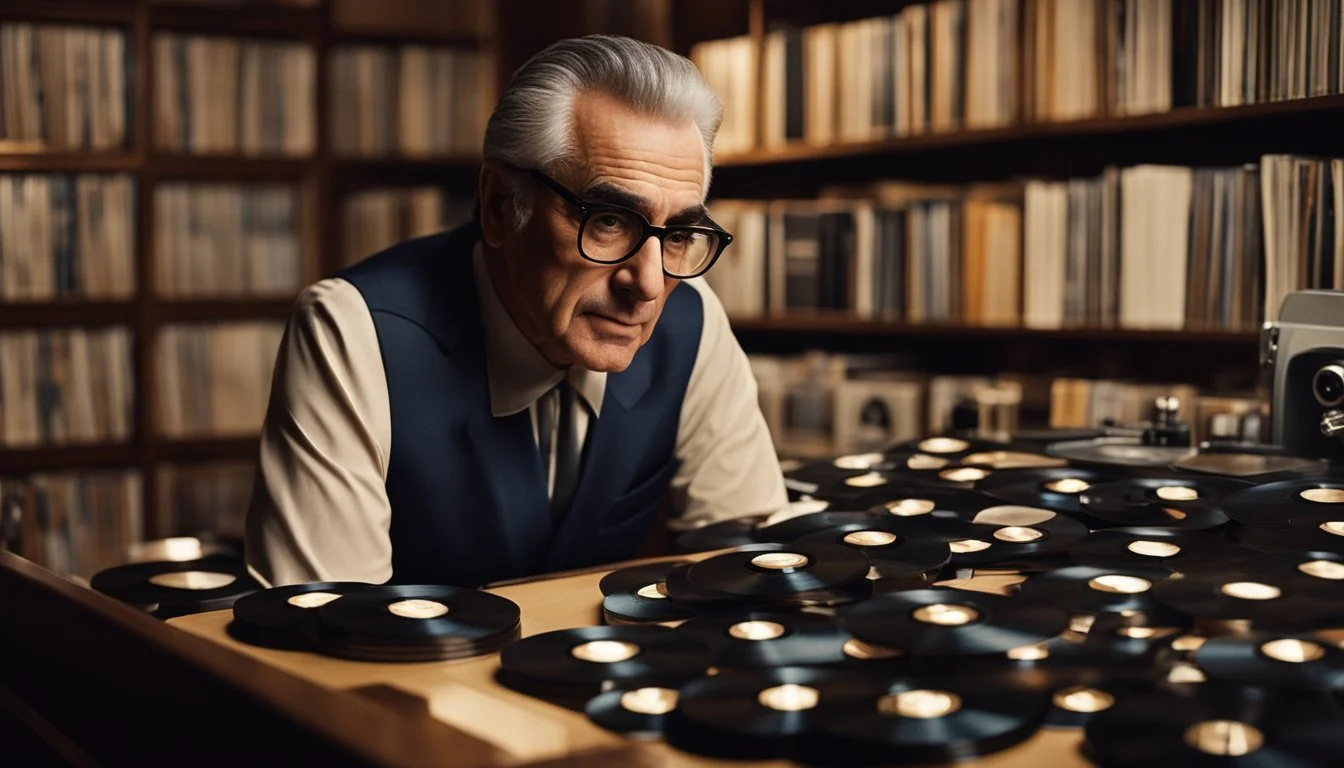Martin Scorsese: Preserving the Legacy of Music and Film in Modern Cinema
Martin Scorsese has not only shaped the cinematic landscape with his groundbreaking films but also committed himself to the preservation of film and music. This dedication stems from his profound belief in the power of cinema to reflect and influence human experience. By founding The Film Foundation, Scorsese has helped restore over 850 films, ensuring that future generations can access and appreciate these cultural treasures.
In addition to his work in film preservation, Scorsese's use of music in his movies stands out as a testament to his meticulous craftsmanship. Songs like "(I Remember) In the Still of the Night" by The Five Satins are strategically placed to evoke specific emotions, highlighting pivotal moments in his films such as "The Irishman." His ability to blend visual storytelling with powerful auditory elements elevates the viewer's experience, capturing the essence of each narrative.
Margaret Bodde, executive director of The Film Foundation, underscores the importance of preserving these cultural artifacts, recognizing the long-term value they bring to society. Scorsese's efforts in safeguarding cinematic history and enhancing films with carefully chosen soundtracks underscore his dedication to the art form. His work ensures that both the films and their music continue to inspire and resonate with audiences worldwide.
The Visionary Filmmaker: Martin Scorsese
Martin Scorsese's profound impact on the film industry is rooted in his early life experiences and shaped by his signature filmmaking style, characterized by meticulous detail and emotional depth.
Early Life and Influences
Martin Scorsese was born on November 17, 1942, in New York City. Growing up in the Little Italy neighborhood of Manhattan, he was heavily influenced by the vibrant street life and cultural dynamics around him.
His early exposure to classic cinema, combined with the Catholic Church's teachings, profoundly impacted his worldview. Scorsese's childhood struggles with asthma kept him indoors, where he developed a deep love for films.
He attended NYU's Tisch School of the Arts, where he honed his craft and created several short films. During this period, he was mentored by professor Haig P. Manoogian and influenced by Italian neorealism and French New Wave cinema. These early experiences laid the groundwork for his future cinematic style.
Signature Filmmaking Style
Scorsese's films are known for their innovative storytelling and visual techniques. He often explores themes of identity, existential crisis, and the complexities of human nature. His use of music, particularly rock and roll, complements his narratives and adds emotional layers to his films.
He employs unique camera work, including tracking shots and rapid editing, which heightens the viewer's engagement. Scorsese's attention to authenticity is notable. He meticulously researches to ensure his settings accurately reflect the time periods he portrays.
Moreover, his collaboration with actors like Robert De Niro and Leonardo DiCaprio has resulted in some of the most memorable performances in modern cinema.
Cinematic Masterpieces
Martin Scorsese has created a legacy through his extensive filmography, marked by a distinct style and collaborations with some of the industry's finest actors. His works are known for their deep psychological insights and vivid storytelling.
Iconic Movies and Directing Highlights
Martin Scorsese's filmography boasts numerous iconic movies. Taxi Driver (1976) remains a seminal work, exploring themes of urban decay and psychosis. Raging Bull (1980) showcases the life of boxer Jake LaMotta, blending intense character study with gritty realism.
Goodfellas (1990) provides a raw, unflinching look at the rise and fall of a mobster, blending dark humor with brutal honesty. In The Wolf of Wall Street (2013), Scorsese examines excess and moral decay in the finance world with a captivating, frenzied energy.
Collaborations with Renowned Actors
Scorsese's collaborations with actors have resulted in many memorable performances. Robert De Niro, a frequent collaborator, has delivered some of his best performances in Scorsese's films, including his roles in Taxi Driver, Raging Bull, and Goodfellas.
Leonardo DiCaprio has also established a strong partnership with Scorsese, starring in Gangs of New York (2002), The Aviator (2004), Shutter Island (2010), and The Wolf of Wall Street. Their mutual understanding and synergy have produced compelling and critically acclaimed films.
Music's Role in Scorsese's Films
Martin Scorsese's work is renowned for its impactful use of music, which enhances storytelling and captures the emotional essence of his characters. He not only incorporates music into his narrative but also explores its cultural significance through documentaries and biopics.
Scoring the Narrative
Incorporating music into his narrative film, Scorsese uses songs to underscore key moments and develop characters. For instance, in "The Irishman," he uses The Five Satins' "(I Remember) In the Still of the Night" to emphasize nostalgic and contemplative scenes. This track is thoughtfully placed during a wedding and over the end credits, framing the emotional tone of the story.
In "The Wolf of Wall Street," music sets the atmosphere for various scenes, such as the raucous office party featuring contemporary tracks. Scorsese's selection of period-specific and popular songs helps to root his films in a specific time and place, enhancing the narrative's authenticity.
Music Documentaries and Biopics
Beyond narrative films, Scorsese has directed numerous documentaries and biopics that focus on the history and impact of music. His works like "The Last Waltz" document the final concert of The Band, blending live performances with interviews and archival footage to capture the band's legacy.
In "George Harrison: Living in the Material World," Scorsese delves deep into Harrison’s life, highlighting his profound influence on both music and culture. These documentaries not only celebrate the artists but also explore their personal journeys, offering viewers an in-depth look at their contributions to the music world.
Preservation of Film and Music
Martin Scorsese's commitment to preserving both film and music is unwavering. His work ensures that future generations can experience classic cinema and music through restoration and education initiatives.
The Film Foundation
Scorsese co-founded The Film Foundation in 1990. This non-profit organization is dedicated to the preservation and restoration of film. To date, it has saved over 850 films, including features, shorts, and documentaries.
The foundation collaborates with archives and studios globally to restore films that might otherwise be lost. Its efforts extend beyond physical restoration, implementing educational programs to raise awareness about the importance of film preservation.
Advocacy and Restoration Projects
Scorsese is a vocal advocate for film preservation. He often highlights its cultural significance and the need for immediate action. Through projects like the restoration of "The Red Shoes" and "Lawrence of Arabia," the effect of his advocacy is tangible.
These projects are not just about saving old films. They ensure high-quality transfers to digital formats, safeguarding the cinematic experience for the future. Scorsese's advocacy has inspired other filmmakers to take similar actions to preserve their works.
Cultural Impact
Martin Scorsese's work has significantly influenced modern cinema and left an indelible mark on popular culture. His films often tackle complex themes while pushing the boundaries of filmmaking techniques.
Influence on Modern Cinema
Scorsese's films, including Taxi Driver, Goodfellas, and The Wolf of Wall Street, have become cultural touchstones. These works are renowned for their innovation in storytelling and their exploration of human psychology and societal issues.
Directors and filmmakers around the globe cite Scorsese's techniques and stylistic choices as major inspirations. His dynamic camera movements, precise editing, and detailed character studies set new standards in the industry.
Moreover, Scorsese's advocacy for film preservation through initiatives like The Film Foundation ensures that cinematic history remains accessible for future generations. This commitment not only protects past works but also influences contemporary filmmakers to value and maintain their own contributions to the art.
Awards and Recognition
Martin Scorsese has earned significant acclaim and numerous awards for his contributions to the film industry. His work has not only been recognized by the Academy Awards but also by various other prestigious institutions.
Academy Awards and Nominations
Martin Scorsese stands out in the world of cinema with his multiple nominations for the Academy Award for Best Director. He has received ten nominations, more than any other living director, surpassing even Steven Spielberg. His notable wins include the award for Best Director for "The Departed" in 2007. Scorsese's films, known for their storytelling and directorial excellence, have received numerous other nominations across various categories, reflecting his significant impact on the industry.
Other Notable Achievements
Beyond the Academy Awards, Scorsese has been honored with numerous other accolades. His achievements include winning the Golden Globe for Best Director multiple times, the BAFTA Fellowship, and the AFI Life Achievement Award. He founded The Film Foundation in 1990, which has facilitated over 850 film restorations, preserving cinematic history. His influence has also been recognized through prestigious lifetime awards and honors that celebrate his enduring contributions to the art of filmmaking.
Educator and Mentor
Martin Scorsese's commitment to education and mentorship has profoundly impacted the film industry. His teaching efforts, lectures, and supportive guidance for fledgling directors are testament to his dedication.
Teaching and Lecturing
Scorsese has held numerous teaching positions, sharing his knowledge at universities and film institutions. Notably, he taught at New York University, imparting skills to students eager to learn about cinema.
His lectures often cover film history, directing techniques, and the importance of cinematic storytelling. These sessions not only educate but inspire a new generation of filmmakers to explore and innovate within the medium.
Mentorship and Support for Emerging Filmmakers
Scorsese has a history of supporting up-and-coming directors. Through initiatives like The Film Foundation, he helps preserve cinematic history while fostering new talent.
He provides mentorship by actively engaging with young filmmakers, offering advice and feedback on their projects. His influence extends to championing independent films and helping directors navigate the complexities of the industry, ensuring a bright future for filmmaking.
Personal Philosophy and Interviews
Martin Scorsese's commitment to film preservation reflects his deep-felt beliefs about the significance of cinema and music. As a filmmaker, he often shares his philosophies in interviews, highlighting the intimate connection between storytelling and the auditory experience.
Views on the Art of Filmmaking
Scorsese considers filmmaking an essential cultural record. He emphasizes the need for preserving films to protect this collective memory. He believes that films capture not just stories but also the essence of specific eras and cultures, making their preservation critical.
Scorsese's frequent collaboration with The Film Foundation demonstrates his drive to safeguard these artistic treasures. He argues that maintaining access to historical films enables future generations to understand their roots and the evolution of visual storytelling.
Perspective on Music in Storytelling
For Scorsese, music is an integral part of storytelling. He often selects music that enhances the emotional depth of scenes, drawing from a vast knowledge of both classical and contemporary sources. Music, in his view, is not just background noise but a character in itself, advancing the narrative and amplifying the audience's experience.
In interviews, Scorsese highlights this practice, citing examples from his films where the soundtrack plays a pivotal role. Whether it's the use of rock music in Goodfellas or the operatic scores in Raging Bull, he meticulously curates each piece to align with the film's emotional tone. The thoughtful integration of music underscores his belief in its power to transform and elevate cinema.
Recent Works and Future Endeavors
Martin Scorsese's dedication to cinema continues with several noteworthy projects. In 2019, he released The Irishman, a crime epic that garnered critical acclaim. His use of de-aging technology showcased a blend of modern techniques with classic storytelling.
He remains active in film preservation. Through The Film Foundation, established in 1990, Scorsese protects and restores essential pieces of film history. This project ensures that significant films remain accessible for future generations.
In 2023, Scorsese is focused on finishing Killers of the Flower Moon, a historical drama based on the Osage murders. The project, starring Leonardo DiCaprio, explores a dark chapter in American history.
Future Projects:
Flower Moon marks his continuation of producing stories with deep historical contexts.
Collaborations with frequent partners like Robert De Niro and DiCaprio promise more compelling narratives.
Scorsese's influence extends beyond directing. He promotes global cinema through the World Cinema Project, enhancing the visibility of international films.
His willingness to adopt new technologies exemplifies his innovative spirit, ensuring that his work remains relevant while preserving cinematic heritage.






